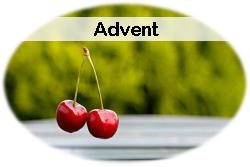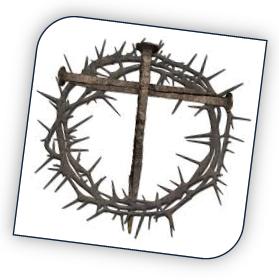Advent and the First Gospel Promise
Advent and the First Gospel Promise
And I will put enmity between thee and the woman, and between thy seed and her seed. It shall bruise thy head, and thou shalt bruise his heel.
Genesis 3:15
Genesis 3 has rightly been called "the black chapter" of Scripture. Our fall in Adam is the blackest reality of human history. Genesis 3 tells us sad truth about ourselves.
Any attempt to exclude ourselves from Genesis 3 is futile. Through the fall of Adam as representative head in the covenant of works, we have all become children of the devil and servants of sin. We have subjected ourselves to the sentence of death, the infinite wrath of God, the curse of the law, and the dominion of Satan. Experientially, we must become Adam before God. The fall must become our fall, our guilt.
 Genesis 3 unlocks the secrets of numerous tragic truths. How did we break God's covenant, scorn His majesty, trample His law underfoot, challenge His attributes? How did we turn our backs on our worthy Creator? How did we cast away His image in its narrower sense – exchanging ignorance for knowledge, unrighteousness for righteousness, and perversity for holiness? Genesis 3 informs us succinctly, graphically, tragically.
Genesis 3 unlocks the secrets of numerous tragic truths. How did we break God's covenant, scorn His majesty, trample His law underfoot, challenge His attributes? How did we turn our backs on our worthy Creator? How did we cast away His image in its narrower sense – exchanging ignorance for knowledge, unrighteousness for righteousness, and perversity for holiness? Genesis 3 informs us succinctly, graphically, tragically.
Genesis 3 unveils how we have become what we are by nature: lost, condemnable, rejectable sinners; dead in sins and trespassess; death- and hell-worthy, fit to be vessels of sovereign and just reprobation. Total depravity, separation from God, slavery to Satan, the origin of sin and evil, the cause of all misery and death, a stained creation – Genesis 3 explains it all.
A black chapter indeed! Its blackness is beyond human expression. Who can comprehend the depth of our fall and its consequences for our natural hearts? "The heart is deceitful above all things, and desperately wicked: who can know it?" (Jer. 17:9).
By nature, we do not know ourselves. Daily we live out our fall unawares in actions, thoughts, words, motives, and perceptions. We are blind to our blindness. We are such slaves of Satan that this enslaver's hold over us passes us by largely unnoticed. As Rev. Ledeboer said, "Our greatest misery is that we do not know our misery."
Grace, however, changes all this. For God's people, sin becomes sin. Satan becomes the archenemy. The fall becomes their fault. The burden of original sin becomes ten times greater experientially than the burden of actual sins. Paul expresses this burden well when he exclaims: "For I know that in me (that is, in my flesh,) dwelleth no good thing: for to will is present with me; but how to perform that which is good I find not. For the good that I would I do not: but the evil which I would not, that I do … O wretched man that I am! Who shall deliver me from the body of this death?" (Rom. 7:18, 19, 24).
 Happily, Genesis 3 also speaks about this grace of self-awareness, of self-abasement, as well as the grace of divine intervention and provision. Genesis 3 may also rightly be called "the red chapter" of Scripture, for three reasons: On its page the Father's first gospel promise of His coming, blood-shedding Son is unfurled (v. 15). On its page the first exercise of faith in the Father's advent promise of life is expressed by Adam in the naming of his wife Eve, which means in Hebrew life or living (v. 20)! On its page, the first sacrificial blood is spilled, pointing to the gospel (in God's slaying of animals to make Adam and Eve coats of skins, v. 21).
Happily, Genesis 3 also speaks about this grace of self-awareness, of self-abasement, as well as the grace of divine intervention and provision. Genesis 3 may also rightly be called "the red chapter" of Scripture, for three reasons: On its page the Father's first gospel promise of His coming, blood-shedding Son is unfurled (v. 15). On its page the first exercise of faith in the Father's advent promise of life is expressed by Adam in the naming of his wife Eve, which means in Hebrew life or living (v. 20)! On its page, the first sacrificial blood is spilled, pointing to the gospel (in God's slaying of animals to make Adam and Eve coats of skins, v. 21).
Against the black backdrop of Genesis 3's tragedy, God paints a red chapter of atonement, a white chapter of hope. Genesis 3 preaches that God is always ahead of Satan. It preaches amazing, staggering grace to lost sinners. Especially in the first gospel promise of Genesis 3:15, it presents sovereign grace as flowing out of enmity announced by God, conflict waged against Satan, and victory assured in Christ.
Enmity Announced by God⤒🔗
Advent is upon us once again. December 3, 1989, introduces Advent and, simultaneously, a new ecclesiastical year. For four weeks prior to Christmas, the message of Advent sets the tone for the Christian church's festival season which lasts for six months, finding its culmination in Pentecost on June 3, 1990, the Lord willing.
"Advent" is a Latin word which means coming, arriving, approaching, and often contains the notion of haste. The church calls its four-week pre-Christmas season Advent because of the comings of Jesus Christ. In the fulness of time, He came with haste in Bethlehem's manger (the First Advent). He shall come again upon the clouds with haste to judge the living and the dead when God's time is ripe (the Second Advent).
For God's church, Advent contains profound meaning. Advent memorializes the past. Advent confesses faith for the future. Advent gives expression to present yearnings and hope. Advent preaches that the coming Christ of yesterday and of tomorrow is the always coming, always advent Christ of today. Advent preaches that Christ is always on His way, always near-at-hand, yes, always present. Advent proclaims, "For He hath said, I will never leave thee, nor forsake thee … Jesus Christ the same yesterday, and today, and forever" (Heb. 13:5b, 8).
Genesis 3:15 is the first Advent text of Scripture. Most remarkable is its beginning – "And I will put enmity." In the original Hebrew, which often accents the first word of a sentence, we read: "Enmity will I put…" "Enmity" introduces Scripture's first gospel promise and sets the tone for the entire verse!
For lost, fallen sinners, deliverance and enmity are inseparable. Some find this astonishing. Some do not believe it. They say the gospel should contain nothing but love. Still others do not understand. They ask: Why does God begin with enmity? Wasn't enmity already present? Didn't Satan show enmity when he tempted Eve? Didn't Eve show enmity when she gave fruit to Adam? Didn't Adam show enmity when he ate forbidden fruit and then blamed God and Eve for his sin? Why would God bring more enmity into a world which only moments prior knew nothing of enmity?
 Enmity itself was not the problem in Paradise. Adam and Eve should have been at holy enmity with, and full of holy hatred towards, the serpent for even suggesting the possibility of eating of the forbidden tree. They knew well that such eating entailed challenging God's authority, calling Him a liar, breaking His covenant and fellowship.
Enmity itself was not the problem in Paradise. Adam and Eve should have been at holy enmity with, and full of holy hatred towards, the serpent for even suggesting the possibility of eating of the forbidden tree. They knew well that such eating entailed challenging God's authority, calling Him a liar, breaking His covenant and fellowship.
Adam and Eve had a misdirected enmity. They directed their enmity against God instead of Satan. Mercifully, the Lord came to intervene in the Paradise scene to redirect their enmity to its proper focus: sin and Satan. The Lord said, as it were, "Enmity will I place between the serpent and his seed (Satan and unbelievers) and the woman and her seed (representing the elect church). I will reverse your newly acquired values. I will cause you to hate what you now love, and love what you now despise. I will plant new enmity. I will give you a new heart."
God's surprising intervention in Paradise was not a request to the "free will" of man; it was a declaration, an announcement of His irresistible, "free grace": "Enmity I will put." God did not stir up enmity already present. He did not request Adam and Eve to put enmity into exercise. In fact, he was not even addressing Himself directly to them, for he was speaking to the serpent.
All of this underscores one solemn truth: Fallen man is not able to put enmity against sin in his own heart. Only God can do what man cannot do for himself. God takes the initiative. This is our only hope as fallen creatures: divine initiative, sovereign intervention, amazing grace.
God takes salvation into His own hands, allowing for no uncertainty: "I will put enmity." Hence, the new birth always does and must bring new enmity. God-planted enmity. Enmity against sin, "old-man" self, Satan, the pride of life, the lusts of the flesh and eye – anything that dishonors the Lord.
Are you experientially acquainted with this sovereign grace: "Enmity will / put"? Dear believer, you know that you not only could not, but also would not, have placed enmity in your own heart against sin. Is not sovereign grace your only hope? That grace which does all for a sinner who can do nothing rightly? That grace which turns around those who are rushing to hell, and plants their footsteps in the narrow pathway to heaven?
It shall bruise thy head, and thou shalt bruise his heel. Genesis 3:15b
Conflict Waged Against Satan←⤒🔗
The fruit of divine planting will always be conflict. Spiritual life is a struggling, bruising battle. It is holy warfare. Scripture's first gospel promise is plain: "It (that is, the Seed of the woman, the Advent Messiah) shall bruise thy (that is, the serpent – Satan's) head, and thou (Satan) shalt bruise His (Jesus Christ's) heel."
The Lord never promised His Son or His people an easy way of salvation. How can the enmity He placed between the devil's/woman's seed, Satan/Christ, world/church, wicked/righteous, flesh/spirit, old man/new man, not lead to conflict?
Where God builds His church on the foundation of the advent proclamation of His Son, Satan will build His temple next door. To the end of time, Satan will wage war against all that is of God and Christ.
 We must not minimize the power of Satan. He never stops nibbling at the heels of the church of God. Though he shall not conquer the living Church, he knows that a church "without heels" will be handicapped and severely weakened in battle. As J.C. Philpot noted: "Satan will never keep a child of God out of heaven, but he is able to keep heaven out of a child of God."
We must not minimize the power of Satan. He never stops nibbling at the heels of the church of God. Though he shall not conquer the living Church, he knows that a church "without heels" will be handicapped and severely weakened in battle. As J.C. Philpot noted: "Satan will never keep a child of God out of heaven, but he is able to keep heaven out of a child of God."
Satan is a fallen angel. His powers far supersede our human powers. He is mighty. Under the permissiveness of divine decree, he bruises the heel of the woman's seed. This is the spiritual conflict of all ages: Cain versus Abel, Ishmael versus Isaac, Esau versus Jacob, Egypt versus Israel. Satan's goal is always the same: Wipe out the chosen. seed. Witness the command of Pharaoh to destroy all Israel's male children. Witness Egypt's attack at the Red Sea or the plot of Haman.
Witness especially Satan's attacks culminating on Christ. Go to the desert of Judea. There we meet Christ who had stepped away from the water of baptism into the fire of temptation. For forty days, Satan attacked fiercely. He raged to bruise the heels of Christ, to get the advent Seed to fall. Every avenue of attack was attempted to get Christ's sacred humanity under satanic control.
In Gethsemane, all the powers of hell were unleashed. Crawling as a worm and no man! Bloody sweat! The profound cry and negated answer: "Oh my Father, if it be possible, let this cup pass from Me" – oh, what soul-bruisings, heel-nibblings Christ experienced! No wonder He spoke to the satanic forces, "This is your hour, and the power of darkness" (Lk. 22:53).
The conflict continues at Gabbatha. The purple robe. The crown of thorns. Scourging. Mockery. Slappings. More internal war and bloody bruisings.
And then Golgotha. Here Genesis 3:15 reaches its apex. The unfathomable cry rings through the darkened realm of nature: "My God, My God, why hast Thou forsaken Me?"
Luther once spent an entire morning trying to comprehend this fourth cross-word, only to arise from his knees, confessing: "God forsaken of God; who can comprehend it?"
 It is incomprehensible, but this much we know: Satan was defeated on the cross – once for all (Heb. 2:14). The victory belongs to Christ. Nevertheless, Satan will not admit to being a vanquished foe. He continues to nibble at the heels of Christ's church. Throughout all ages, victory comes through a suffering, bruising way in Christ. Witness the Acts of the Apostles, the early Church's persecution, the Reformation and Post-Reformation era, the Great Awakening, and times of revivals. The church's most blessed times have also been times of most severe conflict.
It is incomprehensible, but this much we know: Satan was defeated on the cross – once for all (Heb. 2:14). The victory belongs to Christ. Nevertheless, Satan will not admit to being a vanquished foe. He continues to nibble at the heels of Christ's church. Throughout all ages, victory comes through a suffering, bruising way in Christ. Witness the Acts of the Apostles, the early Church's persecution, the Reformation and Post-Reformation era, the Great Awakening, and times of revivals. The church's most blessed times have also been times of most severe conflict.
Tertullian rightly compared the church to a mowed field: "The more frequently it is cut, the more it grows." Church history confirms the adage: The blood of the martyrs is the seed of the church.
Today the conflict continues in the breast of each true believer. Bunyan calls this conflict, "The Holy War." Each believer knows the struggle within between the seed of the woman and the seed of the serpent. Oh, what battles between the old and new man, flesh and spirit, nature and grace! Rebecca-like, God's people often feel two seeds within struggling to break forth, causing the cry: "Why am I thus?" The severity of such struggles can better be experienced than expressed. Oh, what struggles with the triple-headed enemy – Satan, world, and self! What doubts, questions, unanswered riddles, unfulfilled promises, satanic bruisings no wonder such souls become a mystery to themselves!
By nature, we live largely struggle-free. We don't know holy battle. With God's people it is different. Dear friend, if God becomes God in our life, Satan shall become Satan – that archenemy of God, that constant "bruiser" who seeks to avenge day and night. Does he not bruise you severely, dear child of God, at such times as these:
- When he injects blasphemous thoughts into your mind?
- When he then whispers that you cannot be a child of God and have such thoughts simultaneously?
- When he succeeds to get you to question the very veracity and mercy of that God who has never treated you ill?
- When he seeks to persuade you that you have no lot or portion in the matter of salvation, for you have only begun with the Lord and not He with you?
- When he argues with you that no child of God could be like you – so weak in faith, so corrupt, such a poor example, so hard and prayer-less, so foolish and vain?
- When he comes as accuser on the left hand or as an angel of light on the right, seeking to lead you to despair or to presumption?
- When he presents the world to you in fair colors, attempting to move you back into the customs, friendships, and vanities of the world, inch by inch?
- When he presses you to indulge, albeit briefly, in the lust of the flesh, the lust of the eyes, and the pride of life?
God's people experience that the greatest enemy in all spiritual conflict is sinful self. Self becomes chief opponent. On the one hand, the new life desires to live perfectly before God, without sin and blemish; on the other, the old life is constantly pursuing former paths of living without God, without love, and for self.
Oh, what holy battles sometimes wage against self within the renewed heart! Has your own heart ever become your greatest obstacle, greatest plague in spiritual life? Do you know the heavy burden of both hating sin and not being able to purge yourself from it (cf. Rom. 7)?
 Such bruised warriors often fear they are fighting a losing war. Repeatedly they spend all their strength in spiritual struggle only to discover that on account of themselves they are sliding down the perishing slope of sin and, if God prevent not, destruction.
Such bruised warriors often fear they are fighting a losing war. Repeatedly they spend all their strength in spiritual struggle only to discover that on account of themselves they are sliding down the perishing slope of sin and, if God prevent not, destruction.
At such times, spiritual poverty and weakness seem to overcome them. The tempter is following them, bruising and running hard upon their heels. David's cry ascends with groans and pleadings, "I shall one day perish at the hand of Saul." The hand of God is hidden; the brink of hell is visible. Voices within urge the abandoning of all pursuit of God and His grace. Other voices condemn them – justly. Satan is a liar, but much of what he speaks to their condemnation is all too sadly true. Conscience condemns. The law demands and curses. Divine justice is unsatisfied.
They are bitten by the seed of the serpent – by Satan, the world, and their sinful nature. They cannot walk without heels. They must fall, must say farewell to self-help. They must die to self. They must sign their own death sentence that God is righteous and just to cast them away forever. In that signing, not Satan, but self, becomes the greatest culprit. It becomes real: I have fallen. I am polluted throughout. I have chosen death above life, hell above heaven, Satan above God. I have bitten myself.
All seems fatally bruised – all my righteousness, repentance, prayer, humility, worthiness, yes, even my unworthiness. Death is written across all of self.
Victory Assured in Christ←⤒🔗
Within the self-condemned, room is made for the woman's Seed – for the victorious, advent Christ: "It (the Seed, Christ) shall bruise thy head."
Satan's heel-nibbling is burdensome, but not fatal. God overrules it for the good of His people. Through surrender lies victory – victory in Christ. For Christ gathers the self-condemned in His shepherding arms. To them, He opens His gospel victory. He says, as it were: "Dear sheep, Satan bruises your heels, but I have bruised his head for you – in death, in resurrection, and in judgment."
Christ's death. While Christ's heel, that is, the "lower part" which is symbolic of His human nature, was being bruised on Calvary, He was crushing the head of Satan. The same heel Satan was bruising on Calvary was simultaneously crushing Satan fatally, for Christ was making full payment for all the sins of His elect. "Through death He might destroy him that had the power of death, that is, the devil" (Heb. 2:14b).
Christ's resurrection. Satan could not keep the Victor buried. His body could not see corruption. Christ arose from the grave. He showed Himself alive for forty days and ascended in triumph to His Father, leading captivity captive (Ps. 68:18). He is now in heaven at the right hand of the Father beyond the reach of all the nibbling powers of hell. He is in His state of exaltation. He has the keys of death, hell, and grave in His hand. The church is safe in Christ. His resurrection is a pledge of their blessed resurrection.
Christ's judgment. On the day of judgment, Satan and his seed shall be cast out forever. Never again shall Satan trouble the seed of the woman. The Victor will come upon the clouds, seize the old serpent, and cast him eternally into the bottomless pit. The bruising of Satan's head shall then be complete and final. The accuser of the brethren shall accuse no more. All heelnibblings shall be done away. The militant church shall become the church triumphant. All Egyptians shall be drowned (Ex. 14:13-14).
Blessed day when corruption shall inherit incorruption (1 Cor. 15:50)! That day shall usher all the elect into everlasting Advent, everlasting Elim. All good shall be walled in; all evil, walled out. The satanic seed shall be left buried in the grave.
 Keep courage, dear child of God. Christ's seed shall not perish. Your Victor cannot fail. His cause is sure. His Second Advent is near. He will not forsake the work of His own hands.
Keep courage, dear child of God. Christ's seed shall not perish. Your Victor cannot fail. His cause is sure. His Second Advent is near. He will not forsake the work of His own hands.
On the other hand, dear unconverted friend, Satan's seed must perish with him. Hell means to be without God forever, and to be with Satan forever. No relief from his nibblings, from the agonizing worm that dies not, from the evil devices of the wicked one! Terrible shall it be in that day to fall into the hands of the living God! "How shall we escape, if we neglect so great salvation?" (Heb. 2:3a).
To which seed do you belong? There is no third, "in-between" seed. You belong to Christ or Satan.
"Make haste for your life's sake." You are still in the time of grace. The Seed of the woman is still presented to you. Pray that the authentic, Spirit-worked advent cry may become real in your heart, "Give me Jesus, else I die!"

Add new comment